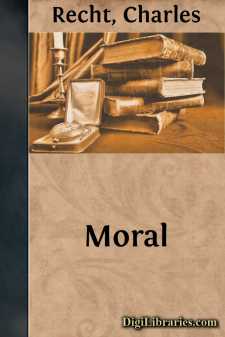Categories
- Antiques & Collectibles 13
- Architecture 36
- Art 48
- Bibles 22
- Biography & Autobiography 813
- Body, Mind & Spirit 142
- Business & Economics 28
- Children's Books 15
- Children's Fiction 12
- Computers 4
- Cooking 94
- Crafts & Hobbies 4
- Drama 346
- Education 46
- Family & Relationships 57
- Fiction 11828
- Games 19
- Gardening 17
- Health & Fitness 34
- History 1377
- House & Home 1
- Humor 147
- Juvenile Fiction 1873
- Juvenile Nonfiction 202
- Language Arts & Disciplines 88
- Law 16
- Literary Collections 686
- Literary Criticism 179
- Mathematics 13
- Medical 41
- Music 40
- Nature 179
- Non-Classifiable 1768
- Performing Arts 7
- Periodicals 1453
- Philosophy 64
- Photography 2
- Poetry 896
- Political Science 203
- Psychology 42
- Reference 154
- Religion 513
- Science 126
- Self-Help 84
- Social Science 81
- Sports & Recreation 34
- Study Aids 3
- Technology & Engineering 59
- Transportation 23
- Travel 463
- True Crime 29
Moral
by: Charles Recht
Description:
Excerpt
Dr. Ludwig Thoma, perhaps better known to his Bavarian countrymen as Peter Schlemiehl, was born in Oberammergau on January 21, 1867. After graduating from a gymnasium in Munich, he studied at the School of Forestry at Aschauffenburg. He did not finish his course there, but entered the University at Munich and received his degree as Doctor Juris in 1893.
A year later Dr. Thoma began to practice law; but he abandoned that pursuit in 1899 to follow a career for which his inclinations and talents so happily fitted him.
He had been writing humorous verses for Simplicissimus for several years under the pen name of Pete Schlemiehl, with such success that the paper almost became identified by that name. These poems were later published in book form under the title—Grobheiten.
His prose writings in Bavarian dialect as well as his boyhood experiences entitled, Lausbubengeschichten, won a large and warm audience. In 1899 he became the editor of Simplicissimus. From then on his renown grew. The foremost critics of German letters began to take notice of this "Bavarian Aristophanes" and to compare him to Heine and the classics.
When Moral and Lottchen's Birthday appeared, while the reviewers shook their heads and stated that Dr. Thoma was shocking (so in original) they concluded that their author was "casting a long shadow." To-day Dr. Thoma is a recognized figure in Germany. Prof. Robert F. Arnold in "Das Moderne Drama" (Strassburg, 1908) ranks him next to Hauptmann. His writings are numerous. A vein, satirical and humorous, with a conception of the pathetic, makes him more than an equal to Mark Twain. In addition he is possessed of a message, which he delivers in the Moral.
First produced in 1908 the play soon became a part and parcel of the repertoire of the leading theatres in Germany. It was put on for the first time in New York, in German, at the Irving Place Theatre in the spring of 1914, through the efforts of the late Heinrich Matthias and the writer. Mr. Matthias then played the part of Beermann. Mr. Christians, the director, repeated the performance a number of times that season, each performance meeting with a warm response.
The late Percival Pollard was the first American critic to emphasize the importance of Dr. Thoma's work in his excellent resume of contemporary German literature: Masks and Minstrels of Modern Germany. He pointed out "that no country where hypocrisy or puritanism prevail as factors in the social and municipal conduct should be spared the corrective acid of this play."
H. L. Mencken and George Jean Nathan for many years have sung praises of the Moral in the Smart Set. But its production on the English speaking stage still remains an event eagerly to be awaited. Briefly, the play is a polemic against the "men higher up," churchmen, reformers, and social hypocrites.
The translation follows the text implicitly. Four different versions were made all varying in a degree from the original, and although Dr. Thoma wrote to the writer "bin auch damit einverstanden dass Sie in der Ubersetzung meines Schauspieles 'Moral' etwaige Aenderungen oder Adaptiereungen, die durch die englisch-amerikanischen Verhaltnisse und den Geschmack des amerikanischen Theatrepublikums geboten erscheinen, in entsprechender Weise vornehmen …" it was deemed best for purposes of publication to try to preserve the original atmosphere without an attempt to even transpose such phrases as Gnadige Frau, or Herr Kommerzienrat....


